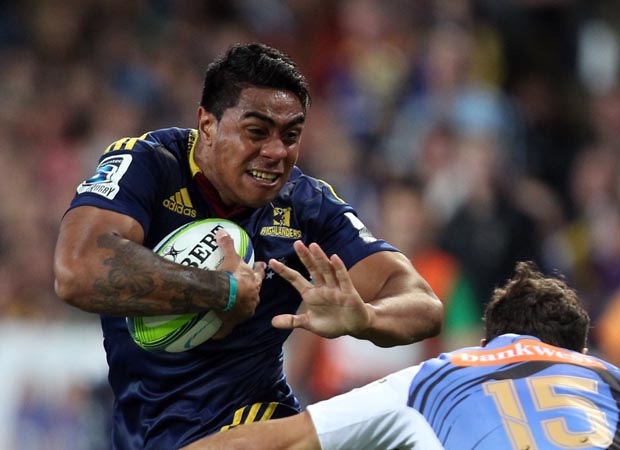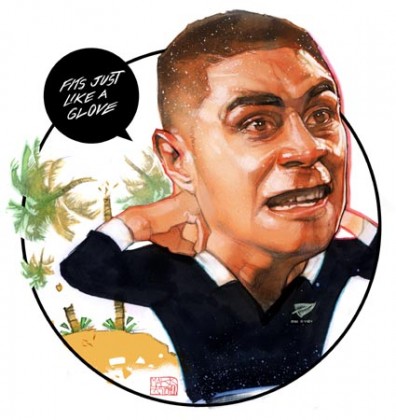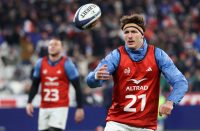
It does not take a genius to work out why New Zealand coach Steve Hansen wants Fekitoa. The strapping youngster’s latest highlight was a barnstorming 50 metre solo try in the Highlanders’ surprise win over the table-topping Sharks in Durban last weekend. This Super 15 campaign has revealed that great balance, power, pace and perceptive passing skills are all part of the Fekitoa package.
However, a search into Fekitoa’s background reveals that he is not only Tongan born, but Tongan raised – until he was offered a rugby scholarship at one of Auckland’s top rugby schools, Wesley College, at the age of 17.
This method of cherry-picking the top talent from the Pacific Islands is a well-travelled path by leading New Zealand rugby schools. Another case that comes to mind immediately is Sitiveni Sivivatu.
Sivivatu went to Wesley College on a scholarship from Fiji when he was 15, and was picked for the All Blacks only after he had already played three Tests for the Pacific Islanders, a side created in 2004 by amalgamating Fiji, Samoa and Tonga. The explosive winger scored three tries for the Pacific Islanders before going on to play 45 Tests for New Zealand, scoring 29 tries. Ironically, the first four of those came on debut against his own country, Fiji, in 2005.
It is pertinent to ask why New Zealand, which already has a sizeable Polynesian immigrant population, and a significant indigenous population of Maori heritage, should find it necessary to cream off the best players from the Pacific islands as well?
This plundering of the Pacific islands’ playing resources reflects the moral bankruptcy in the corridors of power in the professional game, with not only New Zealand culpable, but other rich first tier national Unions who tacitly encourage the practice. Australia, France, England and Ireland are all complicit in the Polynesian trade.
So are the IRB, because they do not have administrators with the vision or conviction to take their rich members to task, shaming them into extending international rugby’s ludicrously short three-year residential qualification period.
I advocated in this column a couple of years ago that it should be extended to eight years, thereby blocking the trafficking of talented Pacific island teenagers into schools and academies in first tier rugby nations which then put them on their own international production lines.
This week the IRB’s complicity in the rampant pillaging of Pacific islands was evident when Brett Gosper, their chief executive, said that the game’s governing body had no intention of extending the international residency period and would not interfere in the “huge market forces” at work in the world game.

Maybe Gosper can explain where the balance is in only four nations (New Zealand, Australia, South Africa and England) having won the World Cup with seven tournaments held already. While he’s at it how about explaining why the IRB’s plan to have second tier nations regularly making the quarter-finals, and semi-finals, is in tatters?
Gosper even went as far as to say “the capture ages are pretty high” when it comes to the poaching game. What is a ‘high capture age’? Is it 15 or 17 – or 13? Irrespective, the message to the player traffickers from the chief executive of the IRB is that it is okay to pick off as many teenage Pacific island rugby players as they want – and hang the consequences for the game in Fiji, Samoa and Tonga. As Gosper put it, “these aren’t issues that we can really look at”.
Everyone recognises that economic migration is a fact of life, and one often with mutual benefits. Furthermore, no one in their right mind would deny a talented young rugby player from a poor Pacific island background the benefits of making the most of their gifts via a sports scholarship or grant.
However, there is a distinct difference between doing that for the betterment of an individual player – and also to the benefit of the school, club or province that has sponsored him – and purloining them for good by giving them a new nationality.
In the case of the Vunipola brothers, because their Tongan parents migrated to the UK when they were small children, and they meet an eight-year residency qualification, I have no issue with them playing for England.
By comparison, Manu Tuilagi‘s case is blurred. His parents did not migrate, and he came on a Leicester-sponsored school sports scholarship when he was in his early teens. As a result, as expressed on this page previously, I believe that he should be playing for Leicester and Samoa – not Leicester and England.
The reality is that if players like Tuilagi and Fekitoa continue to be picked off by nations like England and New Zealand the international game, with its World Cup showpiece, is going to become the preserve of the rich tier one Unions in perpetuity.
Unless Gosper and his boss, Bernard Lapasset, recognise the urgent need to extend the international residency qualification from three years to eight the base of truly competitive rugby nations simply will not grow. It will also reveal all the IRB’s mission statements about growing the game, evident in their stillborn plan of strengthening the second tier nations, as nothing but empty platitudes.
Given the remarkable stream of rugby talent that flows from the Pacific islands it is a near certainty that if it was harnessed to strengthening the international standing of Fiji, Tonga and Samoa we would soon have ten nations (New Zealand, South Africa, Australia, England, France, Wales, Ireland, Fiji, Tonga, and Samoa) capable of getting at least to the semi-finals of the World Cup.
The economics of the pro rugby landscape dictate that most of those players would still play for European clubs or Southern Hemisphere Super franchises. It would also dictate that the IRB would have to increase their funding to the Pacific island nations to ensure that the differential in international remuneration between tier one and tier two nations were not a Grand Canyon apart.
That way the likes of Fekitoa would play for Tonga, not New Zealand; Nathan Hughes (Wasps) and Semesa Rokoduguni (Bath) would play for Fiji, not England; and Bundee Aki (Connacht) for New Zealand, not Ireland.
Work to extend the residency period, Mr Gosper, and give the international game the chance to grow stronger.
























